China Books & Literature
Groundbreaking: “Explicit” Sexual Education Textbook Causes Stir in China
“How can you teach children sexual education without talking about sex?”
Published
7 years agoon
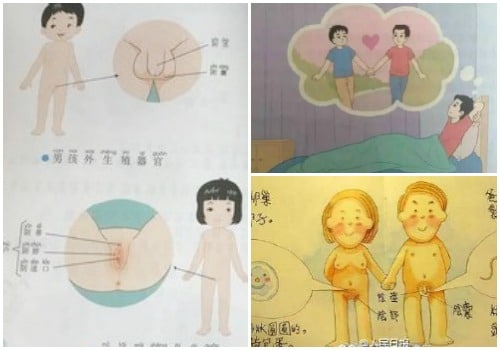
A new Chinese elementary school textbook that teaches children about intercourse, homosexuality, menstruation and gender equality, has caused a stir on social media in China. Although some criticize the book for its “graphic illustrations”, others are overjoyed with this bold step forward for sexual education in China.
An illustrated Chinese elementary school textbook (珍爱生命-儿童性教育读本) has sparked debate on Sina Weibo because of its open way of approaching sexual education.
The book, published by Beijing Normal University, shows pictures of reproductive organs and of two people having sex. It also teaches children about sexual abuse, homosexuality (both of gays and lesbians), and gender equality.
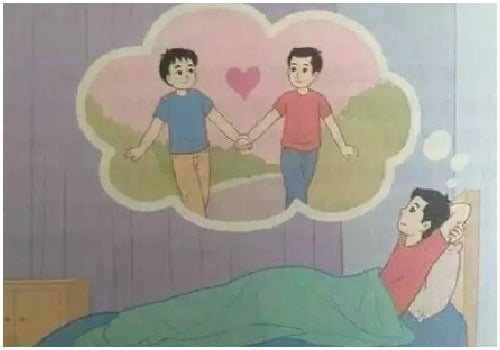
The new text books, published by Beijing Normal University, teaches children that homosexuality is normal.
The book initially came to public attention when a mother took a picture of her child’s book, where a woman says to a man: “Can you show me your penis?” The woman complained about the “graphic illustrations” on Chinese social media.
It soon led to netizens criticizing this new “explicit” way of teaching children about sex. But many people also objected to this criticism, arguing that this was an advanced move for China’s sexual education, that has been often criticized for lagging behind.

The controversial text books are part of a series called ‘cherish life’, with different books for different grades (珍爱生命-儿童性教育读本).
Besides dealing with homosexuality (a controversial topic in China), it also warns children about sexual harassment – not just affecting girls but also boys -, promotes single life as a personal choice, and tells children is it perfectly normal for men to take care of the household.
According to China’s News Service, the Beijing Normal University Publishing Group stated that the materials involved underwent strict scrutiny (“经严格审核”) before being published.
“The majority of people are heterosexual, but there are also some people who feel attracted to the same sex. This is a completely normal phenomenon.”
On Sina Weibo, a 20-year-old student of journalism named ‘Didi’ (@_滴滴打笛) strongly supported the book in a blog published on March 3. She condemned those criticizing the teaching material, saying: “Everyone knows sexual education in China is lagging behind, but when it finally takes a big step forward, people can only focus on ‘pornography’ and trifling matters.”
‘Didi’ explains how the book covers sexual education for children of various ages at the elementary school level. For the younger students, it provides information about the external and internal structure of the male and female reproductive organs through its illustrations. By also covering other organs and body parts, the book helps to “normalize” discussion of the reproductive organs, Didi argues.
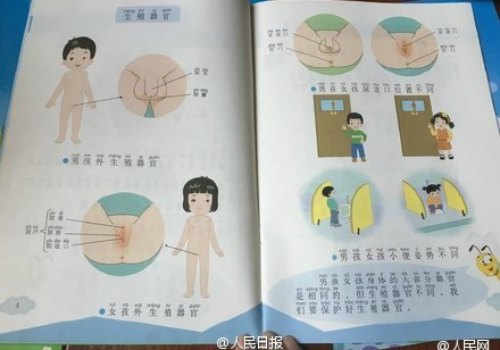
For children in higher grades, the book talks about menstruation, sexual intercourse, and other topics.
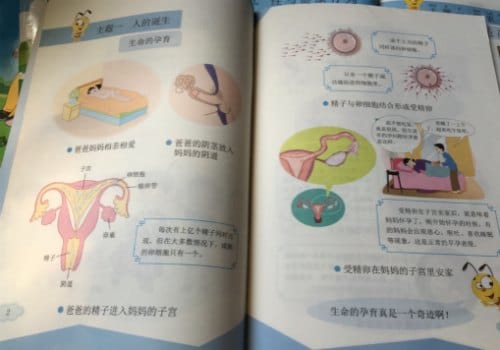
The concept of homosexuality is introduced at the highest levels; teaching children that homosexuality is a natural thing. An illustration shows two students asking their teacher about their two female neighbors who live together as a couple (image below).
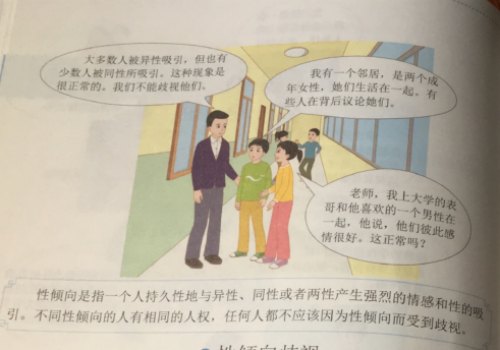
Teacher tells students: “The majority of people are heterosexual, but there are also some people who feel attracted to the same sex. This is a completely normal phenomenon. We can’t discriminate against them.”
“The majority of people are heterosexual, but there are also some people who feel attracted to the same sex. This is a completely normal phenomenon. We can’t discriminate against them,” the teacher says.
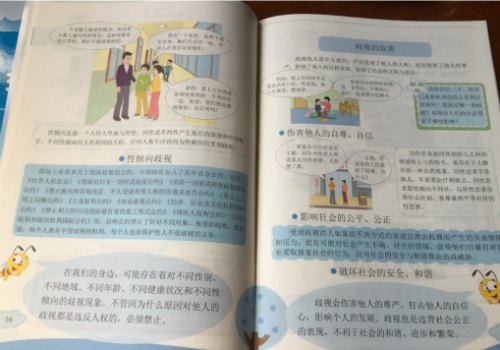
Although the contents of the books differ per grade, they all deal with how children can protect themselves against sexual abuse. The illustrations are not only focusing on abuse by adult men of girls, but also of adult men of boys, adult women of girls, etc.
The books also focus on gender equality, explaining that men and women have equality on the job market and that all professions, it being a soldier or factory worker, can be pursued by both boys and girls.

The books teach kids they can be whatever they want regardless of their gender.
Didi says: “I was moved to tears seeing this (..). For children, these textbooks are like a holy book, and when the teacher tells them that women can become police officers, that men can be nurses, it is such an encouragement for them. And when you explain to children that homosexuality is normal and that they shouldn’t discriminate against it, it really is a step forward against discrimination.”
“How can you teach children sexual education without talking about sex?”
According to Didi, the book is now used as teaching material at (at least) 13 different educational institutions in Beijing.
Chinese state media outlet People’s Daily dedicated a Weibo post to the controversy over the book on March 4, reiteraring the statement of the publishing house that tells people that the clear illustrations help children to better understand sex. They also write that children are pure and unbiased, and that these drawings should not just be perceived with an “adult perspective” (“不能用成人的观点来看”).
Nevertheless, there are still many netizens who are upset and angered over the book, calling it “tasteless” and “vulgar.”
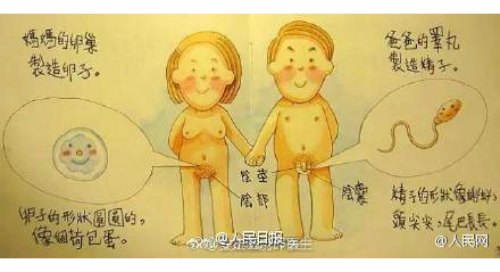
Some say the book is “pornographic”, and parents express worries that this book will negatively affect their children’s idea of what is ‘normal.’
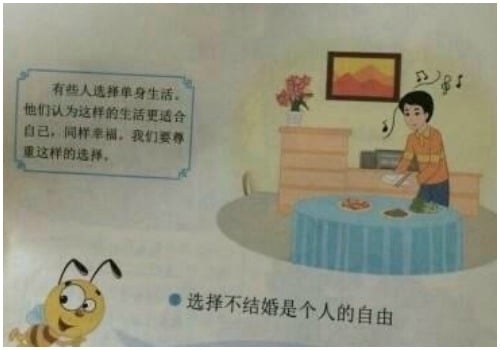
“Some people live alone. They think it suits them to be by themselves. They are equally happy. We value their choice.”
But the majority of netizens are in favor of this new kind of sexual education and say that the book is “very good,” and that those who criticize it are “lacking integrity” themselves. “There’s just nothing wrong with this book,” many say.
“How can you teach children sexual education without talking about sex?”, others wonder: “If we don’t properly explain sex education to our children, it will only lead them in the wrong direction.”
“What a fantastic book,” one person writes: “It is important to teach children this, and to promote equality between men and women. Anyone who thinks of porn when seeing this is just obsessed with sex.”
The school books are also sold through Amazon, with the publication dates of various books ranging from 2013 to 2016. According to Baidu, a first edition of the book was published in April of 2011. The 48-page book, targeted at children in the age group of 7-10, includes the chapters “Understanding your own body”, “Understanding the body of the opposite sex”, “Don’t expose yourself in public places”, “Reproduction”, “Take good care of yourself”, “Stay away from dangerous places.” Besides the chapters related to sexual education, it also has chapters that teach children about personal hygiene, washing their hands, and brushing their teeth.
– By Manya Koetse
Many thanks to Diandian Guo.
Follow @WhatsOnWeibo
©2017 Whatsonweibo. All rights reserved. Do not reproduce our content without permission – you can contact us at info@whatsonweibo.com.
Manya Koetse is the founder and editor-in-chief of whatsonweibo.com. She is a writer, public speaker, and researcher (Sinologist, MPhil) on social trends, digital developments, and new media in an ever-changing China, with a focus on Chinese society, pop culture, and gender issues. She shares her love for hotpot on hotpotambassador.com. Contact at manya@whatsonweibo.com, or follow on Twitter.

China Books & Literature
Why Chinese Publishers Are Boycotting the 618 Shopping Festival
Bookworms love to get a good deal on books, but when the deals are too good, it can actually harm the publishing industry.
Published
2 months agoon
June 8, 2024By
Ruixin Zhang
JD.com’s 618 shopping festival is driving down book prices to such an extent that it has prompted a boycott by Chinese publishers, who are concerned about the financial sustainability of their industry.
When June begins, promotional campaigns for China’s 618 Online Shopping Festival suddenly appear everywhere—it’s hard to ignore.
The 618 Festival is a product of China’s booming e-commerce culture. Taking place annually on June 18th, it is China’s largest mid-year shopping carnival. While Alibaba’s “Singles’ Day” shopping festival has been taking place on November 11th since 2009, the 618 Festival was launched by another Chinese e-commerce giant, JD.com (京东), to celebrate the company’s anniversary, boost its sales, and increase its brand value.
By now, other e-commerce platforms such as Taobao and Pinduoduo have joined the 618 Festival, and it has turned into another major nationwide shopping spree event.
For many book lovers in China, 618 has become the perfect opportunity to stock up on books. In previous years, e-commerce platforms like JD.com and Dangdang (当当) would roll out tempting offers during the festival, such as “300 RMB ($41) off for every 500 RMB ($69) spent” or “50 RMB ($7) off for every 100 RMB ($13.8) spent.”
Starting in May, about a month before 618, the largest bookworm community group on the Douban platform, nicknamed “Buying Like Landsliding, Reading Like Silk Spinning” (买书如山倒,看书如抽丝), would start buzzing with activity, discussing book sales, comparing shopping lists, or sharing views about different issues.

Social media users share lists of which books to buy during the 618 shopping festivities.
This year, however, the mood within the group was different. Many members posted that before the 618 season began, books from various publishers were suddenly taken down from e-commerce platforms, disappearing from their online shopping carts. This unusual occurrence sparked discussions among book lovers, with speculations arising about a potential conflict between Chinese publishers and e-commerce platforms.
A joint statement posted in May provided clarity. According to Chinese media outlet The Paper (@澎湃新闻), eight publishers in Beijing and the Shanghai Publishing and Distribution Association, which represent 46 publishing units in Shanghai, issued a statement indicating they refuse to participate in this year’s 618 promotional campaign as proposed by JD.com.
The collective industry boycott has a clear motivation: during JD’s 618 promotional campaign, which offers all books at steep discounts (e.g., 60-70% off) for eight days, publishers lose money on each book sold. Meanwhile, JD.com continues to profit by forcing publishers to sell books at significantly reduced prices (e.g., 80% off). For many publishers, it is simply not sustainable to sell books at 20% of the original price.
One person who has openly spoken out against JD.com’s practices is Shen Haobo (沈浩波), founder and CEO of Chinese book publisher Motie Group (磨铁集团). Shen shared a post on WeChat Moments on May 31st, stating that Motie has completely stopped shipping to JD.com as it opposes the company’s low-price promotions. Shen said it felt like JD.com is “repeatedly rubbing our faces into the ground.”
Nevertheless, many netizens expressed confusion over the situation. Under the hashtag topic “Multiple Publishers Are Boycotting the 618 Book Promotions” (#多家出版社抵制618图书大促#), people complained about the relatively high cost of physical books.
With a single legitimate copy often costing 50-60 RMB ($7-$8.3), and children’s books often costing much more, many Chinese readers can only afford to buy books during big sales. They question the justification for these rising prices, as books used to be much more affordable.
Book blogger TaoLangGe (@陶朗歌) argues that for ordinary readers in China, the removal of discounted books is not good news. As consumers, most people are not concerned with the “life and death of the publishing industry” and naturally prefer cheaper books.
However, industry insiders argue that a “price war” on books may not truly benefit buyers in the end, as it is actually driving up the prices as a forced response to the frequent discount promotions by e-commerce platforms.
China News (@中国新闻网) interviewed publisher San Shi (三石), who noted that people’s expectations of book prices can be easily influenced by promotional activities, leading to a subconscious belief that purchasing books at such low prices is normal. Publishers, therefore, feel compelled to reduce costs and adopt price competition to attract buyers. However, the space for cost reduction in paper and printing is limited.
Eventually, this pressure could affect the quality and layout of books, including their binding, design, and editing. In the long run, if a vicious cycle develops, it would be detrimental to the production and publication of high-quality books, ultimately disappointing book lovers who will struggle to find the books they want, in the format they prefer.
This debate temporarily resolved with JD.com’s compromise. According to The Paper, JD.com has started to abandon its previous strategy of offering extreme discounts across all book categories. Publishers now have a certain degree of autonomy, able to decide the types of books and discount rates for platform promotions.
While most previously delisted books have returned for sale, JD.com’s silence on their official social media channels leaves people worried about the future of China’s publishing industry in an era dominated by e-commerce platforms, especially at a time when online shops and livestreamers keep competing over who has the best book deals, hyping up promotional campaigns like ‘9.9 RMB ($1.4) per book with free shipping’ to ‘1 RMB ($0.15) books.’
This year’s developments surrounding the publishing industry and 618 has led to some discussions that have created more awareness among Chinese consumers about the true price of books. “I was planning to bulk buy books this year,” one commenter wrote: “But then I looked at my bookshelf and saw that some of last year’s books haven’t even been unwrapped yet.”
Another commenter wrote: “Although I’m just an ordinary reader, I still feel very sad about this situation. It’s reasonable to say that lower prices are good for readers, but what I see is an unfavorable outlook for publishers and the book market. If this continues, no one will want to work in this industry, and for readers who do not like e-books and only prefer physical books, this is definitely not a good thing at all!”
By Ruixin Zhang, edited with further input by Manya Koetse
Independently reporting China trends for over a decade. Like what we do? Support us and get the story behind the hashtag by subscribing:
Spotted a mistake or want to add something? Please let us know in comments below or email us. First-time commenters, please be patient – we will have to manually approve your comment before it appears.
©2024 Whatsonweibo. All rights reserved. Do not reproduce our content without permission – you can contact us at info@whatsonweibo.com.
China Books & Literature
The Many Books Lost in the China Floods: Catastrophic Flooding Hits Zhuozhou’s Publishing Industry
After Typhoon Doksuri, some major warehouses in Zhuozhou have seen their depots transform into a sea of floating books.
Published
12 months agoon
August 2, 2023
Dozens of prominent Chinese publishing companies and book warehouses based in Hebei’s Zhuozhou, a major hub for the publishing industry, have witnessed their book depots destroyed as water levels surged as high as the second floor. Distribution will be at a standstill for at least 15 days.
Zhuozhou (涿州) is a county-level city in Baoding, Hebei Province, known as a major hub for the Chinese publishing industry. It is one of the areas that has been badly affected by the heavy rainfall and flash floodings China has seen this week, after Typhoon Doksuri moved from the Philippines to Taiwan toward Beijing and surrounding regions in mainland China.
In Zhuozhou, dozens of publishing warehouses were affected by floods and water damage due to the storm, resulting in losses amounting to hundreds of millions of yuan. Zhuozhou’s print media industry is closely linked with the center of China’s publishing industry in Beijing, just 25 miles away.
Some warehouses, such as that of Beijing China Media Times, are as large as 8000 square meters, housing over three million books. According to Sina News, one area that housed around 200 publishing companies was almost entirely flooded.
A Weibo post by the Hong Kong Ta Kung Wen Wei Media Group (HKTKWW, @大公文匯網) showed the status quo at some warehouses, which had changed into a sea of books.

Posted on Weibo by HKTKWW, @大公文匯網, the situation at the Beijing China Media Times book warehouse in Zhuozhou.

Posted on Weibo by HKTKWW, @大公文匯網, the situation at the Beijing China Media Times book warehouse in Zhuozhou.
Publisher Books China (中图网), known as an industry “outlet store” for selling discounted and out-of-print books, also saw its central Zhuozhou warehouse completely flooded.
Around 100 of their staff members remained trapped at the office on Tuesday night without any food, drinks, or blankets, while water levels continued to rise. An additional cause for concern was the strong odor emanating from a nearby adhesive tape factory. Some employees suspected that toxic gases might have leaked, leading to several of them feeling unwell and vomiting after exposure.
According to China News (@中国新闻网), all employees were safely evacuated on Wednesday.

Photo posted on Weibo by China News (@中国新闻网), showing how the Books China (中图网) major warehouse was severely impacted by the recent floods, with water levels rising up to the second floor.

In an interview with Chinese newspaper Southern Weekend (南方周末), Beijing China Media Times CEO Ran Zijian (冉子健) revealed that his company had not received any advance warning about the heavy rains and the possibility of flooding, despite the area being prone to floods due to its low-lying terrains. All of the company’s 3.6 million books are now submerged underwater.

Photos provided to Southern Weekend, Weibo.
The water levels rose so rapidly on Tuesday that there was hardly any time to rescue the books, making the evacuation of staff members the first priority. Bookseller Zou Bin (邹斌) told Southern Weekend that he saw the water levels rising so fast in his 5,000 square meter warehouse that he basically witnessed “25 million yuan [$3.5 million] disappear in an hour, powerless to do anything about it.”
According to several Chinese news outlets, the distribution and dispatching of books will be impossible for numerous publishing houses based in Zhuozhou for at least the next 15 days. As the local book industry continues to assess the damages, it remains uncertain how severely the companies have been affected at this stage. For some, it feels like they are starting from scratch all over again.
But most netizens emphasize that it’s more important that employees are safe, as people’s lives are more important than paper books. “Who cares about dispatching books at this time?” some commenters wonder, while others express grief about all the books lost, saying, “It’s just such a pity.”
By Manya Koetse
Get the story behind the hashtag. Subscribe to What’s on Weibo here to receive our newsletter and get access to our latest articles:
Spotted a mistake or want to add something? Please let us know in comments below or email us. First-time commenters, please be patient – we will have to manually approve your comment before it appears.
©2023 Whatsonweibo. All rights reserved. Do not reproduce our content without permission – you can contact us at info@whatsonweibo.com.
Subscribe

Weibo Watch: The Future is Here

“Bye Bye Biden”: Biden’s Many Nicknames in Chinese

Enjoying the ‘Sea’ in Beijing’s Ditan Park

A Triumph for “Comrade Trump”: Chinese Social Media Reactions to Trump Rally Shooting

Weibo Watch: Get Up, Stand Up

The Tragic Story of “Fat Cat”: How a Chinese Gamer’s Suicide Went Viral

“Old Bull Eating Young Grass”: 86-Year-Old Chinese Painter Fan Zeng Marries 36-Year-Old Xu Meng

A Brew of Controversy: Lu Xun and LELECHA’s ‘Smoky’ Oolong Tea

Singing Competition or Patriotic Fight? Hunan TV’s ‘Singer 2024’ Stirs Nationalistic Sentiments

Zara Dress Goes Viral in China for Resemblance to Haidilao Apron

Weibo Watch: The Battle for the Bottom Bed

About the “AI Chatbot Based on Xi Jinping” Story

China’s Intensified Social Media Propaganda: “Taiwan Must Return to Motherland”

Weibo Watch: Telling China’s Stories Wrong

Saying Goodbye to “Uncle Wang”: Wang Wenbin Becomes Chinese Ambassador to Cambodia
Get in touch
Would you like to become a contributor, or do you have any tips or suggestions? Get in touch here!
Popular Reads
-

 China Insight3 months ago
China Insight3 months agoThe Tragic Story of “Fat Cat”: How a Chinese Gamer’s Suicide Went Viral
-

 China Music4 months ago
China Music4 months agoThe Chinese Viral TikTok Song Explained (No, It’s Not About Samsung)
-

 China Digital10 months ago
China Digital10 months agoToo Sexy for Weibo? Online Discussions on the Concept of ‘Cābiān’
-

 China Arts & Entertainment12 months ago
China Arts & Entertainment12 months agoBehind 8 Billion Streams: Who is Dao Lang Cursing in the Chinese Hit Song ‘Luocha Kingdom’?







Matthias Lehmann
March 20, 2017 at 8:46 am
Thanks for the interesting article. Here are a few translated comments (shortened) from German netizens after tagesschau.de reported about the book.
“Talking with children about sex… makes me ask… what for? Is that species-appropriate? … It doesn’t make any sense at all to confront younger children with a topic that doesn’t correspond with their physical development.”
“Only parents should be allowed to talk [about sex] with primary school-age children. … I’m against brochures and similar standardized texts.”
“Children should learn that there aren’t any taboos and that you can talk about all matters, even if they are uncomfortable at first. … Knowledge protects [children] from abuse and health risks during sex.”
“As adults, we don’t have the right to equate our sexuality with that of children. But to derive from that that children’s sexuality should remain a taboo is a societal systemic error.”
“Sexual intercourse should maybe be dealt with in or around the 5th grade. Homosexuality etc. maybe even a bit later since that’s just a marginal issue, blown up by the media.”
“I see China’s advance [in that matter] as a positive approach.
“When you can use a brochure in schools that deals with homosexuality without negative connotations without hundreds of people launching a protest against children allegedly being ‘made gay’, then China is clearly ahead of us in that regard.”
Source: http://meta.tagesschau.de/id/121515/kinderbuch-in-china-schluss-mit-den-sex-tabus
Oliv
October 3, 2018 at 10:40 am
Hello Matthias
Agree with you Only parents should be allowed to talk
As adults, we don’t have the right to equate our sexuality with that of children. But to derive from that that children’s sexuality should remain a taboo is a societal systemic error
This Didi’ book it is China paradox, I guess… sexual education for children is a problem, but COME ONE not at elementary school .
Ok for learn internal structure of male and female reproductive but ..just this basicly…